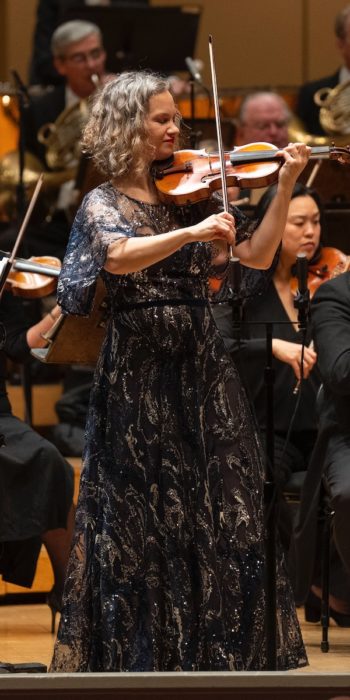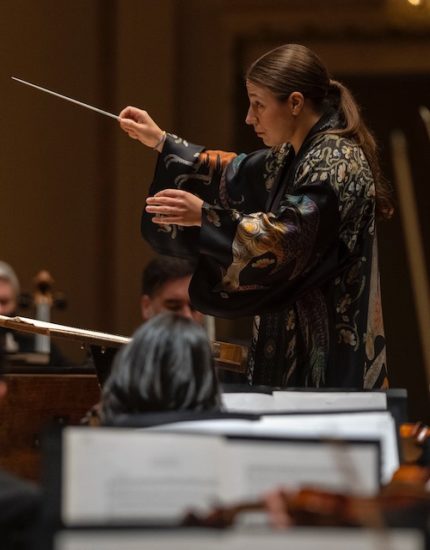Hahn returns with refined Tchaikovsky, and a worthy CSO podium debut

“Vulgarity gains the upper hand, and asserts itself to the end of the first movement. The violin is no longer played; it is pulled, torn, and beaten black and blue. [The] finale transfers us to the brutal and wretched jollity of a Russian holiday. We see plainly the savage vulgar faces, we hear curses, we smell vodka…Tchaikovsky’s Violin Concerto gives us for the first time the hideous notion that there can be music that stinks to the ear.”
So wrote critic Eduard Hanslick at the 1881 premiere of Tchaikovsky’s concerto in Vienna. To no one’s surprise, critics can be wrong, as Hanslick was on this occasion. Despite his hard slam, Tchaikovsky’s concerto quickly became one of the cornerstones of the concert hall, where it has remained ever since, beloved for its melodic richness and fiery bravura by soloists and audiences alike
If the old Austrian grouch had been in attendance Thursday night at Orchestra Hall for Hilary Hahn’s lucid and refined performance of Tchaikovsky’s Violin Concerto with the Chicago Symphony Orchestra led by Dalia Stasevska, Hanslick could hardly have credibly termed anything “brutal,” “savage” or “vulgar.”
The American violinist and current CSO artist-in-residence, once again displayed her fluent virtuosity and singular ability to bring a fresh and individual interpretation to even the most familiar warhorses.
From her first entrance Hahn drew out her solo phrases languorously with a silvery tone and communicative grace. She brought consistent delicacy of expression to passages others just bang out, making for a more intimate take on this concerto than usual. Hahn made the famous (and over-familiar) first-movement cadenza an organic and compelling musical idyll not just an opportunity to turn up the flash and volume.
The violinist’s charmingly unpretentious stage presence—smiling at the orchestra’s playing and turning to watch as well as listen to them during her rests—may have been laid-back yet her relaxed demeanor belied the focused precision of her playing.
There was no lack of unbridled excitement in the outer movements. Her tempos and phrasing were notably free in the finale, yet always musical and convincing, as she sailed through all the technical hurdles with ease.
The Canzonetta stayed most in the memory, with Hahn taking a more spacious approach than most. Slowing this Andante down into more of an Adagio, she sustained the musical line and brought a rapt introspection and depth of feeling to music in which lesser soloists are content to glide over the surface.
The CSO woodwinds were full partners here with clarinetist Stephen Williamson and flutist Yevgeny Faniuk backing Hahn with equally sensitive support. Stasevska was a close and attentive partner, drawing fiery tuttis yet scaling down the orchestra to match her soloist and alertly following her quicksilver tempo shifts.
The sustained standing ovation brought Hahn back out for an encore. One of our finest Bach violinists, she offered the Sarabande from the composer’s Partita No. 2 in D minor, rendered with natural feeling and simple eloquence.

The evening began with Paradisfåglar II (Birds of Paradise) by Andrea Tarrodi. Inspired by natural avian phenomena, this Chicago premiere begins with a quiet, rocking phrase in violins against shimmering cymbal. The surging music swells and ebbs, then segues into a series of avian sounds from solo violin and wind instruments. The effects were cleverly scored and striking, even with less consistent balancing from Stasevska.
While inoffensive, the overall effect of Birds of Paradise was decidedly twee, as the British used to say—more befitting a soundtrack for a documentary on the plight of the yellow-breasted bunting. The audience found more to like in this music, warmly applauding the Swedish composer as she took a stage bow.
The Chicago Symphony has enjoyed a long association with the music of Béla Bartók by virtue of its two celebrated Hungarian music directors: Fritz Reiner (1953-1962) and Sir Georg Solti (1969-1991) both of whom knew their compatriot and collaborated with him.
CSO members remaining from the Solti era may be fewer each season, yet a certain idiomatic Magyar quality has remained, as was made manifest by the bracing performance of Bartók’s Concerto for Orchestra, which concluded the evening.
It’s one of the ironies of music that Bartók wrote one of his finest and most popular works while gravely ill (the composer died less than a year after the 1944 Boston premiere), managing to create a brilliant symphonic showpiece that is dynamic, playful and ironical yet life-affirming.
Stasevska led a richly colored and boldly projected performance of this kaleidoscopic score. At times one wanted more terraced dynamics and subtler shading—harp and subsidiary instrumental lines were often as forwardly present as the primary material.
Yet the Finnish conductor was especially good at negotiating the rapid shifts and contrasts of the first movement. The basses’ opening statement emerged as a kind of “Once upon a time” intro, drawn out and setting a tense expectancy for the ensuing outburst of the brassy main theme.
In this showpiece for front-desk players, the CSO musicians were as lively and characterful as one might expect. The wryly raffish bassoons of Keith Buncke and William Buchman took honors in the Game of Pairs movement. For the second time in a month in a Bartok work, clarinetist Williamson seemed to provide a one-man Hungarian folk band with his florid solos.
Stasevska led an impassioned reading of the central Elegia, written to commemorate the passing of Natalie Koussevitzky, wife of the Boston Symphony conductor who commissioned the piece. Stasevska brought out the folkish warmth of the string writing in the Intermezzo, as well as making the rude brasses in the goof on Shostakovich uproariously funny. For once, the finale was taken at a genuine Presto tempo, rounding off Stasevska’s notable CSO debut in a propulsive and exhilarating coda.
Guest artists in principal chairs this week are violist Daniel Foster and horn Abel Pereira, both from the National Symphony Orchestra, and harpist Grace Browning, from the Rochester Philharmonic Orchestra and Santa Fe Opera
The program will be repeated 1:30 p.m. Friday and 8 p.m. Saturday. cso.org
Posted in Uncategorized



Posted Dec 09, 2022 at 12:58 pm by I John
Hahn’s performance was glorious and made me hear this great work in a fresh manner. I disagree with the assessment of this conductor. I found both the concerto and Bartok conducting to be pedestrian.
Posted Dec 09, 2022 at 2:59 pm by GCMP
It was a fine concert, and Thursday almost sold out, which was refreshing to see and hear!
Posted Dec 09, 2022 at 8:13 pm by Jaime Herrera
I sympathize and somewhat agree with Hanslick’s description of the Tchaikovsky concerto upon first hearing. Given that up to that time, he had been witness to the genteel concertos by Vivaldi, Mozart, Beethoven, Mendelssohn, Paganini, Spohr, Viotti, Wieniawski, Vieuxtemps, De Beriot, etc., it must have come as a shock. It is akin to the premiere of The Rite of Spring – people were taken unawares and reacted accordingly. I don’t blame Hanslick one bit.
Posted Dec 10, 2022 at 2:11 pm by W Weller
Not so long ago, the CSO’s own assistant principals would fill in when the principals were absent. If that created a hole in the section, someone from the Civic Orchestra or a freelance musician from Chicago might fill in.
It seems increasingly common, especially in vacant positions, to hire outsiders to sub in principal seats. Perhaps these are informal auditions.
Somehow it doesn’t seem right to pay for transportation, room and board, and professional fees when there are musicians already in the orchestra or in Chicago who could fill those roles for a week. Does not seem fiscally responsible to me.